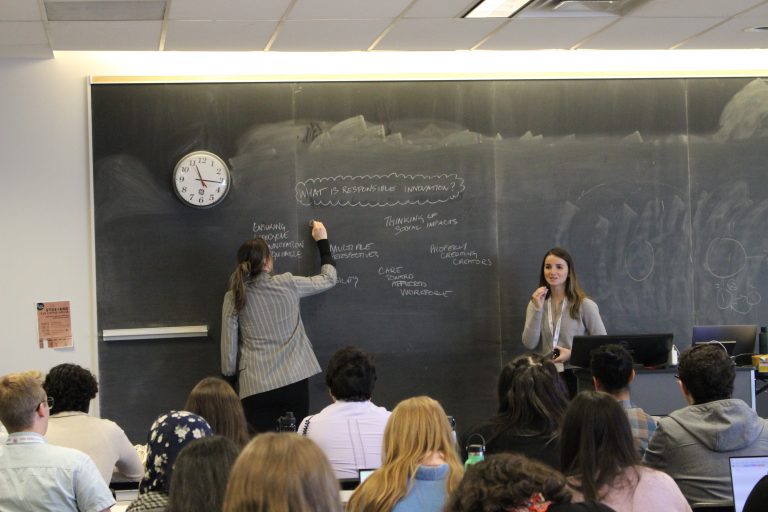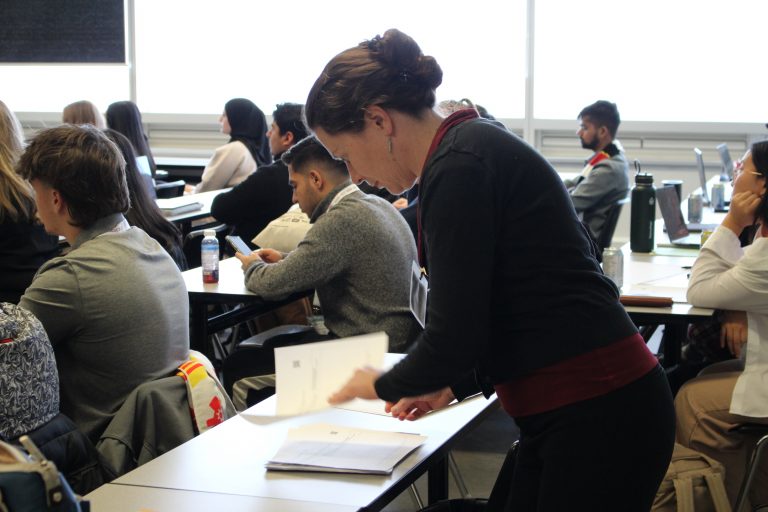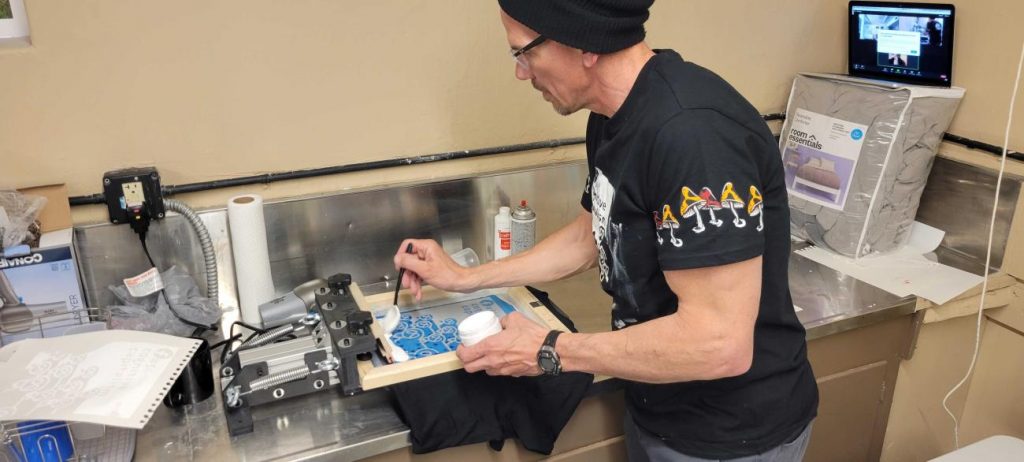Workshops

Our Methodology
The Critical Media Lab and its members have led multiple workshops related to Critical Design (CD), Responsible Innovation (RI), and Value Sensitive Design (VSD) since 2022. The workshops have most often been directed towards engineering students, but they have also accommodated industry professionals and university faculty. Iterations of these workshops have taken place in different venues and contexts, including undergraduate engineering courses, research centers for responsible innovation, a national hackathon, a tech conference with over 2,500 attendees, and a sustainable electronics training program.
Our main question in leading these workshops is this: Can critical design methods, which are generally the domain of arts practitioners, be taught to future tech developers to advance the development of a widespread ethos of responsible innovation?
To advance RI practices in the tech industry, developers must learn how to critically consider the broad context of their innovations, finding and addressing social, psychological, and ecological problems before they arise. Critical design may be a creative way to facilitate this process. This ongoing work hopes to demonstrate that RI can be fostered and championed through a more thorough collaboration between the tech community and disciplines in the arts and humanities—disciplines that excel in the critical contextualization of technological innovation but rarely have the opportunity to intervene directly in the processes that are the subject of that critique.
Due to their limited exposure to ethics and responsible innovation in the Engineering curriculum at large, many students are not intellectually prepared to think critically about the social, environmental, and political implications of the work they will do during their internships and future careers. Through these workshops, we aim to provide students with tools to critically contextualize their work and situate themselves within a RI discourse that questions the dominant narratives of big tech.
At the same time, we acknowledge the potential disconnect students may experience between learning responsible design in the classroom and attempting to actualize these lessons in a fast-paced tech workplace; to this end, we introduce methods that can be injected into the design process to help students think more critically about the downstream impacts of technology
Click the headings below for summaries of our three principal methods:
Critical Design, the key methodology behind Critical By Design, is a research practice that has been described as a mode of ‘problem finding’ rather than ‘problem solving.’ Critical Design is a research practice focused on challenging audience perspectives on the status quo, and it was inspired primarily by the impacts of consumer technologies on human wellbeing. Unlike other methods of design, which focus on the development of a final product or solution, critical design is process-oriented, rhetorical, and discursive. Sample critical design methods include the creation of speculative fictions, ‘what if?’ statements, alternative histories, and objects-to-think-with.
In our workshops, we describe Responsible Innovation in terms of the ethical design and development practices that account for social, psychological, and environmental impacts of technology. We observe that current methods of teaching ethics to tech developers are not enough to establish a strong ethos – beliefs and practices that inform ethical design – of RI. Our workshops work through and against a corporatized vision of RI that prioritizes the idea of gaining competitive market advantage at the expense of ongoing social and environmental problems. We teach developers how these two interests can be more effectively and equitably balanced.
Our workshops also employ Value Sensitive Design, which considers intersections between researchers, designers, engineers, and policy makers by centralizing socially productive and ethically considerate values in design work. VSD asks tech designers to think more critically about the implications of their products on the environment and human experience from the beginning stages of the design process. Workshops that draw on VSD encourage participants to reflect on both principle and hidden stakeholders, integrate multidisciplinary perspectives, and consider the co-dependence between technical innovation and social progressiveness.
Conducting Responsible Innovation Workshops

The responsible innovation workshops typically begin with a facilitator introducing some of the main issues in responsible innovation, such as algorithmic bias, conflict minerals, e-waste, automation, data privacy, and ‘deceptive design’ (also known as dark patterns) (Brignull 2011). As an incentive for adopting responsible innovation measures, the facilitator notes that Environmental, Social and Governance indicators (ESG’s) are gaining popularity among investors. The facilitator then introduces critical design to investigate how issues in responsible innovation might be identified in the participants’ own tech products and services.
The following workshop exercises are adapted for each audience: in some cases, the participants bring their own works-in-progress, and we apply critical design to them, whereas in others we provide examples for participants to work on in groups.
Activity #1: Stakeholder Identification
- The workshop begins with a collaborative exercise in identifying stakeholders for specific tech-related design projects, highlighting the differences between “direct,” “indirect,” and/or “excluded” stakeholders, and emphasizing the importance of accounting for as broad a range of stakeholders as possible during the design process.
Activity #2: Value Identification
- Drawing from Schwartz’s system of basic human values (1992), workshop facilitators will provide an overview of the concept of “values” and some strategies for mapping them. Working in small groups, participants will be tasked with mapping the values that apply to stakeholders identified in Activity #1.
Activity #3: Mapping Value Tensions
- Facilitators will provide an introduction to the notion of “value tensions” (drawing on Friedman and Hendry’s work in Value Sensitive Design), and then ask groups to identify tensions among the stakeholders and values they have worked with. The group will reflect on the ways in which value tensions need to be carefully negotiated during the design process, and how responsible innovation/critical design/value sensitive design require that type of attentiveness.
Final Wrap-Up:
- Facilitators revisited key takeaways from the discussion and offer suggestions for further resources that participants can consult to learn more about the ideas, frameworks, and strategies they have begun to explore in the workshop.
A common staple of our workshops is the Tarot Cards of Tech, a speculative design card deck produced by Artefact, a Seattle-based design firm working with companies in financial, automotive, healthcare, and fashion sectors. There are 12 cards in the deck, each with a handful of prompts for the designer to consider opportunities and consequences of a given technology or scenario. Though Artefact did not explicitly intend for their cards to be used in the context of critical design, we find they are an accessible discussion starter for workshop participants.
The table below lists the Responsible Innovation Workshops our team has lead so far. These workshops were facilitated by faculty and graduate students at the CML, including Dr. Marcel O’Gorman, Dr. Heather Love, Alexi Orchard, and Rebecca Sherlock.
Audience/Venue | Participant (N) | Tool/Method | Date |
uXperience Design Conference | 20 | CD, RI | February 2022 |
Students at Hackathon | 25 | CD, RI | September 2022 |
15 | CD, RI | January 2023 | |
Communitech Founders | 10 | CD, RI | February 2023 |
MBA Students – St. Mary’s University | 20 | CD, RI | April 2023 |
Year 1 Engineering Students | 125* | VSD, RI | 2022-2024 |
Year 3 Engineering Students | 50 | VSD, RI | March 2023 |
IEEE Ethics Conference | 25 | CD, RI, VSD | May 2023 |
Year 4 English Students | 4 | CD, RI, VSD | June 2023 |
Graduate English Students | 10 | VSD, RI | November 2023 |
60 | CD, RI, VSD | November 2023 | |
| Total: 364 |
|
|
Other Workshops

Atelier Technique Populaire
Lincoln Centre for Applied Ethics, Arizone State University (Feb. 13-March 4, 2022)
Dr. O’Gorman conducted this five-part series of workshops during a three-week visit to Arizona State University, drawing in staff, faculty, and students. The goal of the workshop was to prompt reflection on technology’s impact on humans, to examine our role in that impact, and ask who is counted as human in the process. Participants were mobilized to address toxic tech culture directly through hands-on collaborative work that is critically and creatively engaged.
The workshop series’ title is derived from Atelier Populaire, a protest group formed in Paris in 1968 that consisted of students, labor unions, artists, and industry workers who collaborated in spreading posters on a massive scale that communicated their ideas for institutional reform. The idea behind the workshop series is to empower participants to organize their feelings about technology and about toxic tech culture, then embody those feelings in a poetic way that can be visible to publics through the creation of physical artifacts. For this reason, it was especially crucial to include people at the university from multiple institutional positions and academic disciplines.
Retooling the Iron Ring: A Value-Sensitive Approach to Engineering Ritual Design
Canadian Engineering Education Association (CEEA), Kelowna, B.C. (June 18, 2023)
This workshop was a follow-up to the 2022 CEEA-ACEG conference where participants discussed the iron ring, the Obligation, and the Ritual of the Calling of an Engineer, which led to the formation of a working group dedicated to advocating for change to the iron ring ceremony. The workshop builds on these developments through a series of value-sensitive design exercises focused on exploring the relationship between engineering values and engineering rituals. Participants were asked to map the values of different stakeholders associated with the ceremony to imagine new engineering rituals.
The main objective of the workshop was not to create a definitive, updated iron ring ceremony, but rather to use the tools of value-sensitive design and ritual studies to better understand our own values, dominant engineering values, and the relationship between these ideas and an engineering rite of passage. This exploration can inform participants’ future design activities, pedagogies, service work, and advocacy, perhaps by allowing them to imagine new possibilities and preferable futures—in accordance with critical design principles. In addition, the workshop provided engineering educators with processes and activities to use in their own courses, further encouraging an engagement with inclusivity and diversity that can make an impact beyond the classroom.
The workshop was conducted by: Marcel O’Gorman (University of Waterloo), Kari Zacharias (University of Manitoba), Robyn Paul (University of Calgary), Janna Rosales (Memorial University of Newfoundland).
Want to book a workshop with us?
If you’d like to reach out to organize a workshop for a group of students or professionals, please send us an email (criticalbydesign@uwaterloo.ca) or reach out directly to CBD founder Dr. Marcel O’Gorman (marcel@uwaterloo.ca).